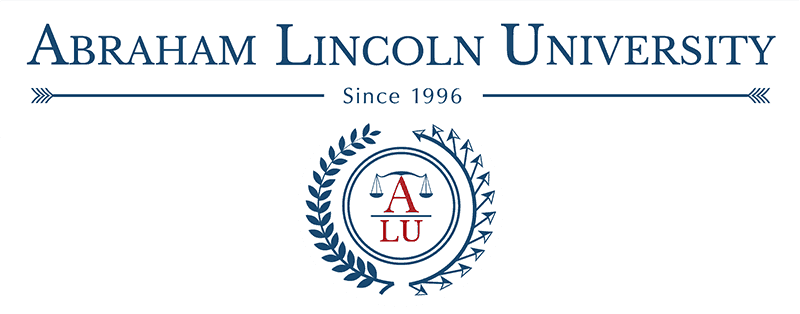Taken after completion of the first year of law school, the First-Year Law Students’ Examination (FYLSX or FYLSE), or “baby bar,” covers the subjects of contract, criminal law, and torts. Passing the exam is a big deal and requires a serious commitment to test preparation.
Statistics show that Abraham Lincoln University students know how to prepare for those first year law student exam questions. For example, in October 2018, 56% of ALU students passed the test on their first attempt while the first-time success rate for students from all law schools combined was only 26%.* In June 2018, 86% of ALU students passed the test on their first attempt while the first-time success rate for students from all law schools combined was only 32%.*
Fortunately, the State Bar of California offers help by publishing past exam questions and answers selected from the best answers provided by students. It’s an honor to have your essay chosen for publication, therefore congratulations are in order for ALU students Felicia Williams and Joseph Wallace. Here they offer their insights on the process and how to prepare for success on the exam.
Felicia Williams
Q: Which essay is yours?
A: I took the FYLSX in October 2018, and my essay that was released from this examination is Selected Answer A – Question Number 3 (Torts).
Q: How did you feel about having your essay chosen?
A: When I first realized Selected Answer A was my essay, I was really shocked. At the time, I was aware that I had passed the FYLSX and I had received a copy of my essays from the exam. Because I had used past released essays and selected answers to help me study for the FYLSX, I was curious to see the selected answers that was released from the October 2018 examination. Once I came across the Selected Answer A for Torts, I had to grab my hard copy, because I was just completely shocked. But overall, I was extremely excited and very flattered.
Q: What steps did you take to help you succeed, and how did ALU help you?
A: I started studying for the October 2018 FYLSX in June 2018. I studied five days a week for a minimum of seven hours each of those days. I created an outline of each topic (torts, criminal law and contracts) and added every rule of law for each of the topics. Then, to make sure that I covered everything by September, I created a time schedule outlining when I was to study each topic and rule of law. I also reviewed my case briefs for further clarification on how a law may have been interpreted. By the time September arrived, I had mastered every rule of law and could focus my time on essay writing and MBE (Multistate Bar Examination) practice.
ALU was a big help to my success of passing the FYLSX. For one, ALU is really big on the IRAC (issue, rule, analysis, and conclusion) style of writing and strongly recommends it for homework. So having homework that’s due on a weekly basis plus feedback from each homework assignment provided me with much experience to help develop my writing style. Writing the essay in IRAC format had become natural to me. Also, something that stuck with me was said in class from every professor I had in 1L at ALU, “Practice your essay writing.” Practice, practice, practice.
Q: Do you have any study tips?
A: Being prepared is key. What worked for me was time management and being disciplined. By managing my time, I was able to ensure that I could cover all of the rules of law and practice my essay writing multiple times. By being disciplined, I made sure that my time wasn’t wasted from other distractions that didn’t have anything to do with my preparation for the FYLSX.
Joseph Wallace
Q: Which essay is yours?
A: FYLSX – October 2017 Question 4: Selected Answer A
Q: How did you feel about having your essay chosen?
A: I felt surprised – I was running out of time because it was the last essay of the day and I had spent too much time on the other essays. My other three essays were formatted better (bolding, underlining, italicizing, etc.), but I knew I had spotted most of the issues in this essay, and I knew that my rule statements were concise. My big takeaway was this: substance over form. You’ll get more points from spotting all of the issues and doing a lengthy analysis than you will from formatting the essay to make it look prettier.
Q: What steps did you take to help you succeed, and how did ALU help you?
A: (1) Practice. Write full practice essays under timed conditions. Very few people finish the essay portion of the FYLSX with time to spare. Most people run out of time. Time management gets easier after you do a few four-hour essay writing sessions for practice.
(2) Use more than one source for practicing the MBEs. Every company writes their MBEs a little bit differently. The more sample questions you can do, the better off you’ll be. I highly recommend Adaptibar, but I also used the Finz book as well as Barbri. Once again, practice under timed conditions. If you’re doing a set of 100, you should have completed at least 33 questions at the 1-hour mark, and 64 questions at the two-hour mark. Don’t lose track of time. The State Bar allows you to bring an analog watch into the exam. Bring one. You’ll need it.
(3) Take the ALU review class. I had an amazing instructor that kept me focused and motivated. It’s easy to become overwhelmed while studying for the FYLSX – there’s a ton of black-letter law to memorize, and sometimes it’s hard to apply. My instructor broke each topic into smaller pieces, and pointed out where I was weak, and where I needed to spend more time studying.
(4) On the day of the exam, the four-hour essay portion of the exam is completed in the morning, and the MBEs are completed after lunch. When you finish the morning session, don’t talk to other people about your essays. Wait until the end of the day to discuss the essays with your friends. Other people will have spotted issues that you missed, or they may have taken a much different approach to an essay than you did. That doesn’t necessarily mean that either of you are wrong, it just means that you had a difference in style. If discussing your essays during lunch is going to make you second-guess yourself, don’t have the discussion until the end of the day. You want to go into the afternoon session confident and energized, not deflated because another person may have spotted issues that you didn’t see.
(5) If you have computer issues on the day of the exam, don’t panic. If you panic, you’ll fail. Raise your hand, talk to one of the test proctors, and do the best that you can handwriting the essays. It happens to a few people every year. If you’re one of those people, stay calm, and roll with it.
Q: Do you have any study tips?
A: (1) Spend as much time studying as you possibly can. Studying for the FYLSX should be your top priority for the few months leading up to the exam. If you can take time off of work to study, do it. This bears repeating: write as many practice essays as you possibly can under timed conditions. The more you practice, the better you get – it’s like learning a musical instrument. Even the most inherently talented musicians spend a lot of time practicing their instrument.
(2) Figure out the study techniques that work best for you. Some people love to write out flashcards in order to memorize legal rules. I hate flashcards. They don’t work for me. I prefer writing outlines, and studying off of my outlines. Spend your time doing the things that yield the best results for you.
(3) Don’t compare your results to your friends results while studying for the FYLSX. Everybody has their own strengths and weaknesses.
(4) Don’t study the day before the exam. If you do poorly on a set of MBE questions, it’s likely to shake your confidence, and that isn’t what you need immediately before taking the test. Also, if you’re still feverishly cramming to memorize rules on the day before the exam, you probably didn’t put enough time into studying throughout the weeks and months leading up to the exam. In my opinion, the day before the exam should be spent relaxing and letting everything sink in. Get to bed early too, because exam day is a grueling marathon.
*Statistics can be referenced on ALU Admissions – Consumer Information, State Bar of California FYLSX – October 2018 General Statistics, and State Bar of California FYLSX – June 2018 General Statistics







This Post Has One Comment
Beautiful information and congratulations to you both.